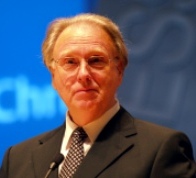Roughly 60 percent of Americans reared in what it defined as the "Adventist family" of churches, a grouping of Protestants dominated by the Seventh-day Adventist, remain in that family as adults, a landmark survey released February 25 revealed.
An extensive new survey by the Pew Forum on Religion & Public Life, based on interviews with more than 35,000 Americans age 18 and older, the U.S. Religious Landscape Survey, finds that religious affiliation in the U.S. is at once "very diverse and extremely fluid." However, "all Protestant denominational families lose a considerable number of childhood adherents to the ranks of the unaffiliated," the group reported.
For the purposes of the study, Pew said, "a 'denominational family' is a set of religious denominations and related congregations with a common historical origin." Along with the Seventh-day Adventist Church, the "Adventist family" listed by Pew includes several other churches which grew out of splits and schisms from the Millerite movement and its offshoots. Seventh-day Adventists, however, comprise the overwhelming majority of that grouping; the church's 1 million members in the United States outpace, by several times, the total combined membership of the other groups in that category.
At the same time, the percentage of those who say they are not affiliated with any particular religious group or tradition has shot up to 16.1 percent of Americans, a net increase of 8.8 percentage points, according to the survey. "Sizeable numbers of those raised in all religions -- from Catholicism to Protestantism to Judaism -- are currently unaffiliated with any particular religion," the Pew document stated. The number of "unaffiliated" people is almost equal to the 18.1 percent of Americans who claim membership in "mainline" Protestant churches.
In addition, the report indicated, "the group that has experienced the greatest net loss by far is the Roman Catholic Church. Overall, 31.4 percent of U.S. adults say that they were raised Catholic. Today, however, only 23.9 percent of adults identify with the Catholic Church, a net loss of 7.5 percentage points."
The non-profit Pew Forum on Religion & Public Life seeks to promote a deeper understanding of issues at the intersection of religion and public affairs. It is a project of the Pew Research Center, a nonpartisan "fact tank" that provides information on the issues, attitudes and trends shaping America and the world.
According to the Pew Forum media release, "the survey finds that constant movement characterizes the American religious marketplace, as every major religious group is simultaneously gaining and losing adherents. Those that are growing as a result of religious change are simply gaining new members at a faster rate than they are losing members. Conversely, those that are declining in number because of religious change simply are not attracting enough new members to offset the number of adherents who are leaving those particular faiths."
Adventist education -- believed to be one of the largest parochial school systems in the world -- plays a part in helping young people remain in the faith, said Debra Brill, vice president for ministries of the church's North American Division.
"Adventists place historic priority on quality religious training for children in a systemic curriculum that spans birth through higher education," Brill said. "This tradition fosters a culture that engages many parents and children in a lifelong affiliation with the Seventh-day Adventist Church."
Monte Sahlin, a church growth specialist and director of research for the Ohio Conference, found positive news in the Pew study, as well as items of concern.
"This study finds the Seventh-day Adventist share of the population at 0.4 percent and the last major study of this kind [the American Religious Identification Survey in 2001] found it to be 0.3 percent then. Over the past seven years, the Adventist Church in the U.S. has increased its share of the population by one third," Sahlin noted.
However, he added, the "potential bad news is the clear evidence of a dropout problem. The 2001 ARIS study found that 73 percent of those reared in the Adventist Church stayed in and that has dropped to 60 percent. The tendency of new generations of Adventists to not bond with our denomination is accelerating."
What to do? "The most important thing we can learn from this kind of study is the changing religious landscape within which we must pursue the mission that God has given us," Sahlin said.
"The fastest-growing segments are made up of these who opt for no religion and those who join congregations not affiliated with any denomination," he added. "There is little real evangelism occurring, in terms of winning significant portions of nonbelievers and/or the unaffiliated into Bible-based Protestant faith. We need to get serious about mission in a secular, post-denominational America and quit going through the same motions over and over." [Editors: Mark A. Kellner from Adventist Review and Christian B. Schaeffler from APD]
To read the full report and explore religion in America online: http://religions.pewforum.org/reports
For a video overview and related material, go to the resource page: http://pewforum.org/docs/?DocID=279

